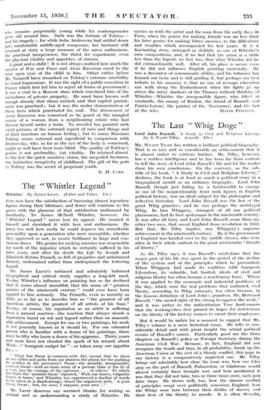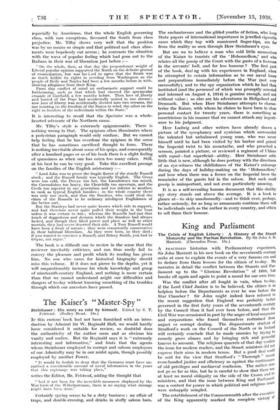The Last " Whig Doge 77
Lord John Russell. A Study in Civil and Religious Liberty. By A. Wyatt Tilby. (Cassell. I5s.) Mn. WYATT TILBY has written a brilliant political biography. That is so rare and so considerable an achievement that it is almost unfair to criticize further. Mr. Tilby, however, has a restless intelligence and he has been far from content to tell the story of Lord John Russell's life and let the reader draw his own conclusions. On the contrary, as the sub- title of his book, " A Study in Civil and Religious Liberty," declares, the book is at least as much a political essay in a biographical mould as an ordinary biography. Lord John Russell, though just failing by a hairbreadth to emerge as one of the unquestionably front rank figures in English political history, was an ideal subject for the philosophic and reflective historian. Lord John Russell was the last of the great Whig grandees, and he was perhaps the architypal Whig. In him Whiggery, strangest of all our political phenomena, had its best spokesman in the nineteenth century. It was after all Grey and Lord John Russell, more than any other two men, that saved England from revolution in 1832. But that, Mr. Tilby implies, was Whiggery's supreme achievement in the nineteenth century. By it the government of England was handed over to the middle classes, who were alien in their whole outlook to the great aristocratic "friends of liberty."
As 'Mr. Tilby says, it was Russell's misfortune that the major part of his life was spent in the period of the decline of the system and of the principles which lie personified. When Whiggery had made its coalition with bourgeois Liberalism, its valuable, but limited, ideals of civil and religious liberty too often became a reactionary force. Where it was applied to the economic and industrial problems of the day, which were the real problems that mattered, civil liberty, according to Whig concepts, too often became, in the famous definition of Lord John's grandson, Mr. Bertrand Russell, " the sacred right of the strong to oppress the weak," and it was rather to the authoritarian Tory land-owners that the working-class first pinned its hopes for restrictions on the liberty of the factory owners to sweat their employees.
But it would be unfair for a moment to suggest that Mr. Tilby's volume is a mere historical essay. He tells in con- siderable detail and with great insight the actual political events of Russell's career. Particularly good are the three chapters on Russell's policy as Foreign Secretary during the - American Civil War. Because, in fact, England did not recognize the South and thus, in all probability, break tip the American Union at the cost of a bloody conflict, this page in -our history is a comparatively neglected one. Mr. Tilby brings out admirably how close the issue was, how one false step on the part of Russell, Palmerston, or Gladstone would almost certainly have brought war, and how accidental it was that they did not take, two or three times over, such just false steps. He shows well, -too, how the sincere conflict of principles swept over politically conscious England, how the Whigs were torn between their dislike of slavery and their love of the .liberty to secede. It is often thought. especially by Americans, that the whole English governing class, with rare exceptions, favoured the South from class prejudice. Mr. Tilby shows very well that the position was by no means so simple and that political and class aline- ments were hopelessly cut across ; he contrasts the situation with the wave of popular feeling which had gone out to the Italians in their war of liberation just before :-
" On the whole, then, at that day the preponderant weight of Liberal popular opinion sumo/bed the North on the definite ground of emancipation; but was inched to agree that the South was as much within its rights in seceding from Washington as the people of Sicily and Naples had been a few months before in with- drawing allegiance from their King. From this conflict of mind no enthusiastic support could bo forthcoming, such as that which had cheered the spectacular crusade of Garibaldi a few months before. Then love of liberty and hatred of the Pope had accidentally united in one stream ; . now love of liberty was accidentally divided into two streams, the one insisting on the freedom of the States to rebel, the other on the right to freedom of the individuals within the State."
It is interesting to recall that the Spectator was a whole- hearted advocate of the Northern cause.
Mr. Tilby's style is extremely epigrammatic. There is nothing wrong in that. The epigram often illuminates where .a pedestrian paragraph would only confuse. But we cannot help feeling that he has overdone the epigram in the sense that he has sometimes sacrificed thought to form. There is nothing inevitable about some of his quips, and consequently after a hundred pages or so of his book there is a slight feeling of queasiness as when one has eaten too many cakes. Still, at his best he can be very good. Take this excellent passage on the families of the English aristocracy :-
"Lord John was to prove the fragile flower of the sturdy Russell stock ; and the Russell family was typically English. The Greys were too cold, the Percys too hot, the Lansdownes too mixed, the Cavendishes too heavy, the Chinchilla too uncertain, and the Cecile too superior in one generation and too inferior in another, to rank as typical English families ; in the whole country there was only one stock, and that the Stanleys, who could rival the claim of the Russells to be ordinary intelligent Englishmen of the better sort.
But the Stanleys had never quite known which side to support, and had therefore never quite pulled their weight in the boat unless it was certain to win ; whereas the Russells had just that touch of doggedness and decision which the Stanleys had always lacked, and though they liked power and place as well as other mortals, they had never deserted their side. - A Tory Russell would have been a freak of nature ; they were consistently conservative in their habitual liberalism. As they were born, so they died ; if you wanted to convince a Russell, said Sidney Smith, you had to trepan, not argue."
The book is a difficult one to review in the sense that the reviewer inevitably criticizes, and can thus easily fail to convey the pleasure and profit which its reading has given him. No one who cares for historical biography should miss this volume. If it does not pierce to the depths, yet it will unquestionably increase his whole knowledge and grasp of nineteenth-century England, and nothing is more certain than that we cannot understand aright our difficulties and dangers of to-day without knowing something of the troubles through which our ancestors have passed.









































 Previous page
Previous page